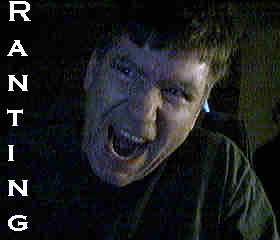Confessions of a journalist
I was reading Betsy Newmark's blog last week and she linked to a story in the New York Post by Ralph Peters. The story, Journalism's Moral Collapse, describes the reality behind the facade presented by the media's supposed holy guardians of the flame of truth.
Pay no attention to that man behind the curtain...prostrate yourselves in supplication before the flaming image of a pure and impartial media. Heretics, apostates and doubters of the holy word shall be cast down to the hellish realms of the Blue States and shall spend eternity wallowing in their ignorance and staring, glassy-eyed, at FOX News.
Hyperbole? Perhaps. But it is no exaggeration to say that media people view their pronouncements as sacrosanct. They know the truth about everything and HOW DARE you question their learned rendering of events?!?
You see I know a little about this because I was a journalist once, before I made the jump to the corner office at Stay At Home Dad/Farmer Inc. I was a reporter, then editor at several daily and weekly newspapers of varying sizes. I also interacted closely with members of the television media at any number of events in large and small markets. I've interviewed senators, representatives, governors, sports stars and even managed to get in a question at a press conference with President Bush 1.
By virtue of their job, even the most well-intentioned media professional can be seduced by the job. Write a feature on a soup kitchen around the holidays and the donations reliably start pouring in..."See what I have created!!" The accolades from the public are even more intoxicating to some. I've seen many reporters make the jump from careful scribes of current events to undisguised advocates in a matter of short months. Criticism can also result in skewed coverage ..."how dare you point out before the levy election that the school district pays its administration 30 percent more than neighboring districts!" Result: The reporter bypasses the financial analysis, and its accompanying controversy, in favor of a feel-good feature about Bob the Frog in the science lab. Absent checks and balances laid down by a no-nonsense editor, the well-intentioned advocacy of the reporter nullifies traditional journalism's roles as an impartial chronicler of daily events.
It doesn't matter that the media professional has the highest intentions; by slanting/slewing/skewing coverage the media violates its compact with the public. If the traditional media cannot be trusted to present a fair picture of current events, its usefulness is eroded.
I mainly talk about the print media, because the other media professionals, in my experience, are useless idiots. Pretty sometimes, pretty useless at all times.
I dropped my subscription to the Cleveland Plain Dealer last year because their coverage of national news was nothing less than yellow journalism. Most of the coverage come from the New York Times, that unabashed liberal cesspool, and that which didn't came from reporters doing their time in the minors in hopes of a shot writing for the Times.
The problem for big media is that people can now peruse the internet for worldwide information. Read a story in the Times and want to learn more? Google it, man! You might find yourself checking the dates and datelines to be sure the media sources are reporting the same story. How the hell did people get an unvarnished view of the world before the internet and the advent of easy fact checking? Short and sweet: They probably didn't. I will add a caveat, however: I think biased and advocacy journalism got a bid boost from Watergate and All The President's Men.
I think the era of Big Media is dead - someone send a Xerox copy of a post-it to Mary Mapes. The MSM is irrelevent with internet usage and computer literacy on the rise. The future will be community-based websites for trading of information - a virtual village marketplace with its own town criers. The world has become both a bigger and smalerl place thanks to the internet: Bigger because we now have access to information on the entire world, not just the small slice our former big media guards allowed through the gates. The world has become smaller, because now every story in every part of the world has a human, personal component and most have multiple voices passing along current events through their blogs.
How dare we look beyond the MSM's version of events? How dare they try to pretend they present current events fairly and fully!
We've looked behind the curtain.


0 Comments:
Post a Comment
<< Home